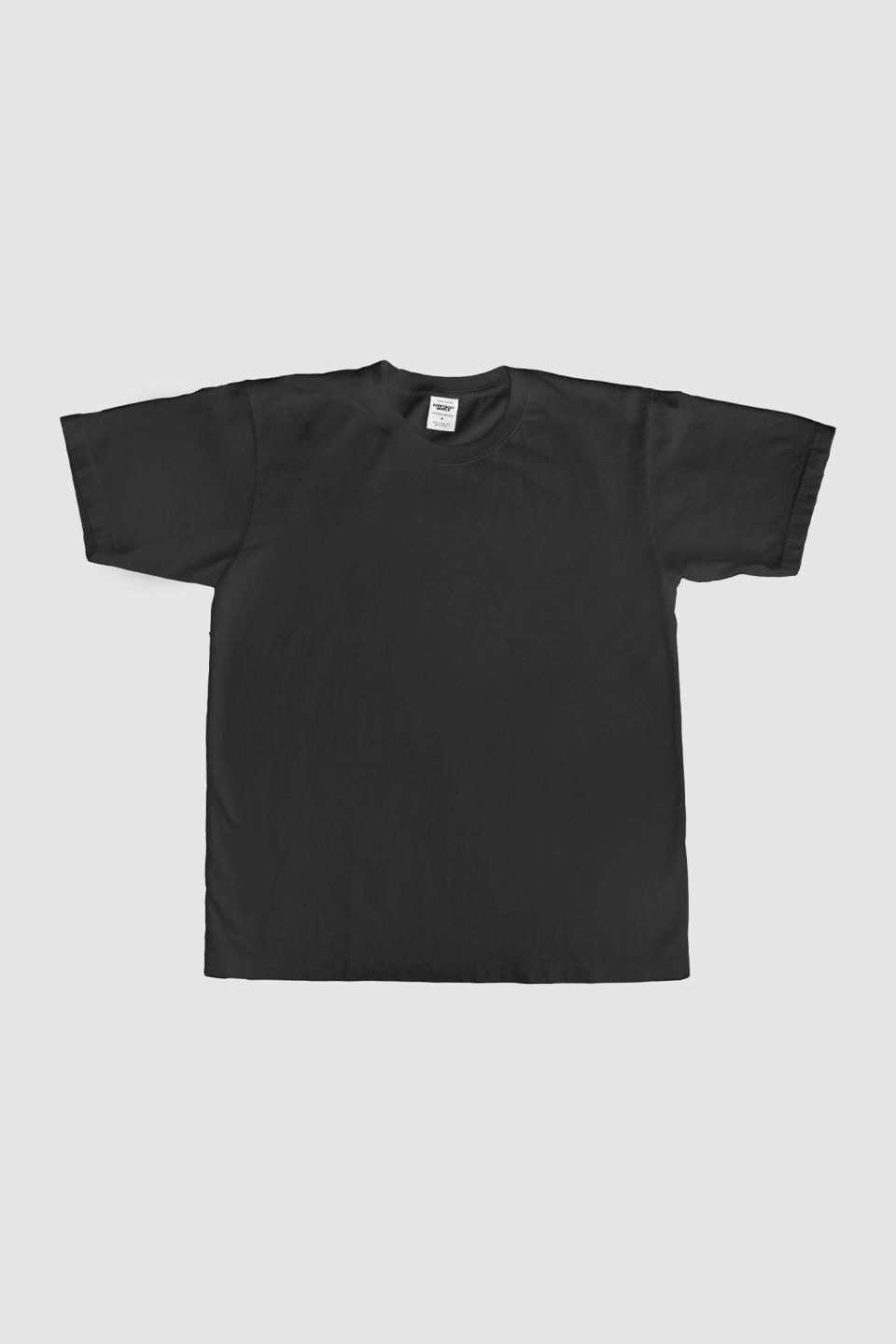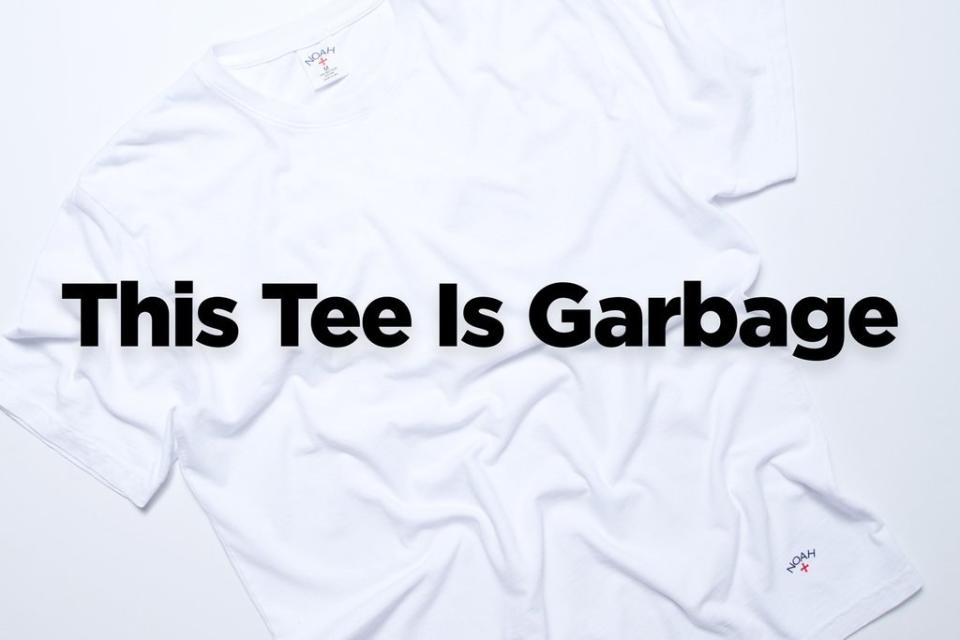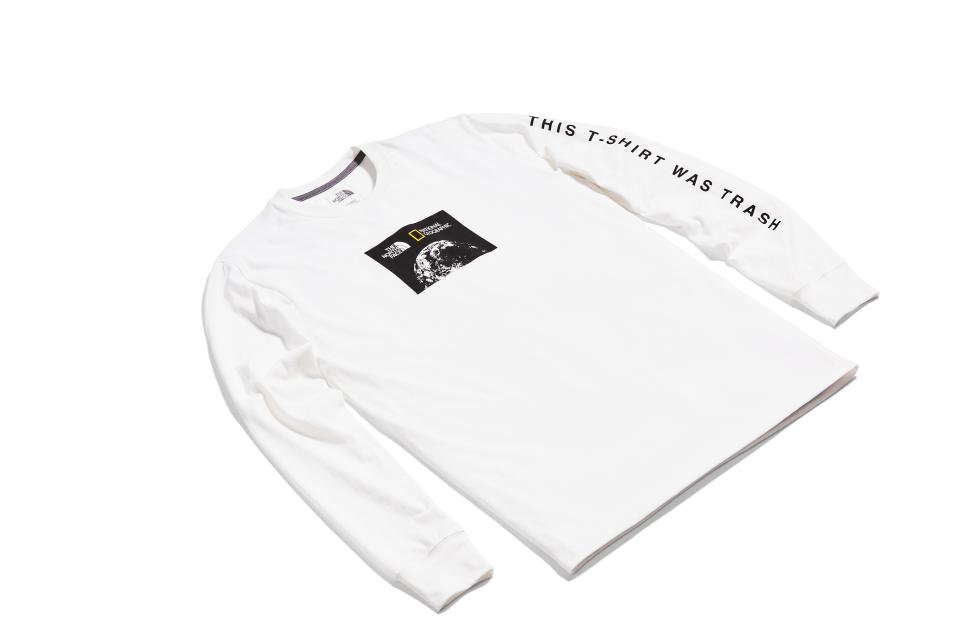Your New Favorite T-Shirt Is Trash
An unfortunate modern truth: trash is everywhere. There are 1.8 trillion pieces of plastic floating in the ocean between California and Hawaii—otherwise known as the Great Pacific Garbage Patch. At the Puente Hills Landfill outside Los Angeles, a 500-foot trash mountain towers so high it was forced to stop accepting more refuse in 2013. Another, somewhat smaller trash anecdote: while visiting a yarn manufacturer in the southern United States a few years ago, the designer Iris Alonzo started poking around and learned an astonishing fact.
“So what's your waste stream look like?’” she recalls asking the man she was working with at a manufacturer during the early stages of product development.
“‘Uh, we've got about 500,000 pounds [of waste].’” he said, according to Alonzo. “And I'm thinking, like, a year. And he's like, ‘A week. At one plant.’”
Some six years later, Alonzo and Carolina Crespo preside over Everybody.World, where they’ve made it their business to do exactly what they were told they couldn’t: make T-shirts out of trash. And they’re not alone. Upcycling used material into apparel has turned into a major industry-wide initiative at corporations like Adidas, which has an ongoing partnership with Parley for the Ocean to turn plastic found in the sea into shoes. Kering, the conglomerate that owns Gucci and Coach, put together a Fashion Pact that sealed the commitment of brands like H&M, Gap, Nike, Ralph Lauren and a whole host of luxury labels to reduce pollution and put the brakes on global warming. All this is done in the name of taking fashion off the list of top global offenders when it comes to pollution. A United Nations study found that the fashion industry produces “20 percent of global wastewater and 10 percent of global carbon emissions.”

But the latest wave of eco-warrior fashion brands are much more brazen about the work they’re doing. Lately, trash itself has received a warm and loving embrace from select brands in the industry. These are the labels that want to elevate the value of trash rather than suppress it. In August, Noah announced a new tee made out of “waste yarns from other cotton productions” in a blog post titled: This Tee Is Garbage. Over the summer, in collaboration with National Geographic, the North Face released a collection of tees made out of repurposed bottles with the text: “This T-Shirt Was Trash.” And Alonzo’s Everybody.World is releasing a trash hoodie in the near future. Up is down; left is right; grails are trash.
The endpoint of Alonzo’s journey came in the spring of 2017, when Everybody.World launched with its signature “Trash Tee.” The item is now the foundation of an entire company, a product sought out by wholesalers who want to slap their own designs on the recycled canvas.
Creating the first fully recycled tee requires a morbid curiosity with trash. Alonzo and Crespo were both American Apparel alums who knew how much waste was created in the manufacturing process. Still, at first, the men at the factory—“Good old boys in the South,” according to Alonzo—were hesitant to hand over their leftover cotton scraps. They figured it was a waste of time. But the Everybody.World founders refined the material for a year until it was ready for sale. Around the factory, this earned them a nickname: the Trash Queens.

They were undeterred. Early samples felt like cardboard, but were at least proof a T-shirt, even a bad one, could be made out of recycled yarn. They spent a year refining the tee until they found the magic words: “Yo quiero como mantequilla,” or “I want it like butter,” Crespo recalled. The result was a T-shirt that was made from refuse, but felt like anything but.
The last piece of business was naming the thing. They started with something straightforward: 100% recycled cotton tee. But then they started swishing a name around in their mouth to see how it tasted. At first, it made Alonzo made her face scrunch up. It was a name that made her say, “Uck”: the Trash Tee. One one hand, it rolled off the tongue. The alliteration, the Oscar-the-Grouch favorite, the simplicity of it all. On the other hand, Alonzo recalls thinking, “I don't think we can say that—people are gonna hate it…We were scared of it because it's a dirty word.”

But the idea behind a name like that, or the North Face’s similar use of “trash,” is to flip the bad word on its head. “It's important to have people know that recycled doesn't mean a diminished quality and that you're not sacrificing anything,” says Carol Shu, The North Face’s sustainability manager. “Your product is going to feel the same. It's going to be just as soft, just as comfortable, just as well designed. Sustainability isn't a sacrifice.” Alonzo adds, “It's this concept of looking at things and just changing your perspective on what is considered valuable and good.”
These brands have found an audience willing and hungry to consume trash. Everybody.World sent a poll to its customers last year and found that 80 percent of them listed eco-friendliness as the reason they purchased from the brand. “Our customers,” North Face’s Shu says, “appreciate the outdoors and by default that comes with an understanding that we need to protect them.”
Other customers literally want to wear their eco-friendliness on their sleeves. In a 2018 survey, Nielsen found that 48 percent of customers were willing to change their buying practice to make them more sustainable. Trash is no longer the dirty word Alonzo thought of it as only a couple years ago. Customers are desirous for trash tees because they want, and are proud of, shopping sustainably.
Of course, there are always people who won’t get it. Alonzo recently received a DM from a friend—”He's like the snobby guy,” she says—who suggested, “You might want to reconsider the name of your T-shirt.” He just didn’t get it. “It's probably not the shirt for everyone and that's okay, but the people that like it—and get it—they really like it.” As they say: one man’s trash is another man’s T-shirt.
Originally Appeared on GQ

